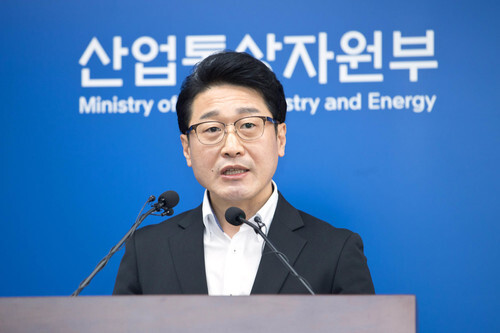hankyoreh
Links to other country sites 다른 나라 사이트 링크
S. Korea asks Japan to clarify its position on resolving export control issue

The South Korean government asked the Japanese government to express its position about its tightened export controls by the end of this month, but Tokyo did not offer a notable response.
South Korea’s Ministry of Trade, Industry and Energy (MOTIE) held a meeting at the Government Complex in Sejong City on May 12 to review the current response to Japan’s export controls and to make plans for the future.
“The South Korean government urges the Japanese government to disclose its stance about plans to resolve the issue of the white list and the three products [that are under export controls],” MOTIE said during the meeting. MOTIE gave Japan until the end of the month to respond in recognition that Japan has declared a state of emergency over the COVID-19 crisis.
“We believe that all the necessary and sufficient conditions are in place for the Japanese government to take action to resolve this issue. There is no reason for it to hesitate about reversing the export controls,” MOTIE emphasized.
On July 1, 2019, Japan altered its export regulations for three key materials related to the manufacture of semiconductors from comprehensive permits to individual permits, and announced that it would remove South Korea from its “white list” of countries that enjoy a streamlined process for exports of strategic materials. In November 2019, the South Korean and Japanese government agreed to resume policy dialogue at the bureau chief level and to temporarily suspend a conflict resolution process at the World Trade Organization (WTO) for the duration of that dialogue.
Since then, the South Korean government has moved to meet Japan’s demands by amending its Foreign Trade Act and significantly increasing its export management review staffing. MOTIE explained, “An amendment of the Foreign Trade Act to more clearly stipulate the legal basis for conventional weapon catch-all controls was completed on Mar. 18 and is scheduled for implementation as of June 19.”
The government also said that no problems of any kind had been found, with sufficient sound export transaction results achieved in its last 10 months of operation for three key semiconductor materials -- EUV resists, fluorine polyimides, and hydrogen fluoride -- and special bulk permits granted for certain items.
“It’s coming up on one year since the Japanese government announced that it was intensifying its export controls on South Korea last July 1. We can’t afford to put off a resolution any longer,” MOTIE said.
But signals from Japan suggest it is unlikely to readily agree. Speaking at a regular press conference that afternoon, Chief Cabinet Secretary and Japanese government spokesperson Yoshihide Suga said, “Our plan is for our expert management authorities to proceed based on a comprehensive assessment of export management by domestic [Japanese] companies and export partners.”
By Lee Jae-yeon, staff reporter, and Cho Ki-weon, Tokyo correspondent
Please direct comments or questions to [english@hani.co.kr]

Editorial・opinion
![[Column] Has Korea, too, crossed the Rubicon on China? [Column] Has Korea, too, crossed the Rubicon on China?](https://flexible.img.hani.co.kr/flexible/normal/500/300/imgdb/original/2024/0419/9317135153409185.jpg) [Column] Has Korea, too, crossed the Rubicon on China?
[Column] Has Korea, too, crossed the Rubicon on China?![[Correspondent’s column] In Japan’s alliance with US, echoes of its past alliances with UK [Correspondent’s column] In Japan’s alliance with US, echoes of its past alliances with UK](https://flexible.img.hani.co.kr/flexible/normal/500/300/imgdb/original/2024/0419/2317135166563519.jpg) [Correspondent’s column] In Japan’s alliance with US, echoes of its past alliances with UK
[Correspondent’s column] In Japan’s alliance with US, echoes of its past alliances with UK- [Editorial] Does Yoon think the Korean public is wrong?
- [Editorial] As it bolsters its alliance with US, Japan must be accountable for past
- [Guest essay] Amending the Constitution is Yoon’s key to leaving office in public’s good graces
- [Editorial] 10 years on, lessons of Sewol tragedy must never be forgotten
- [Column] A death blow to Korea’s prosecutor politics
- [Correspondent’s column] The US and the end of Japanese pacifism
- [Guest essay] How Korea turned its trainee doctors into monsters
- [Guest essay] As someone who helped forge Seoul-Moscow ties, their status today troubles me
Most viewed articles
- 1[Column] The clock is ticking for Korea’s first lady
- 2Samsung barricades office as unionized workers strike for better conditions
- 3S. Korea, Japan reaffirm commitment to strengthening trilateral ties with US
- 4[News analysis] After elections, prosecutorial reform will likely make legislative agenda
- 5[Editorial] When the choice is kids or career, Korea will never overcome birth rate woes
- 6Japan officially says compensation of Korean forced laborers isn’t its responsibility
- 7[Editorial] As it bolsters its alliance with US, Japan must be accountable for past
- 8Why Israel isn’t hitting Iran with immediate retaliation
- 9[Column] Has Korea, too, crossed the Rubicon on China?
- 10All eyes on Xiaomi after it pulls off EV that Apple couldn’t